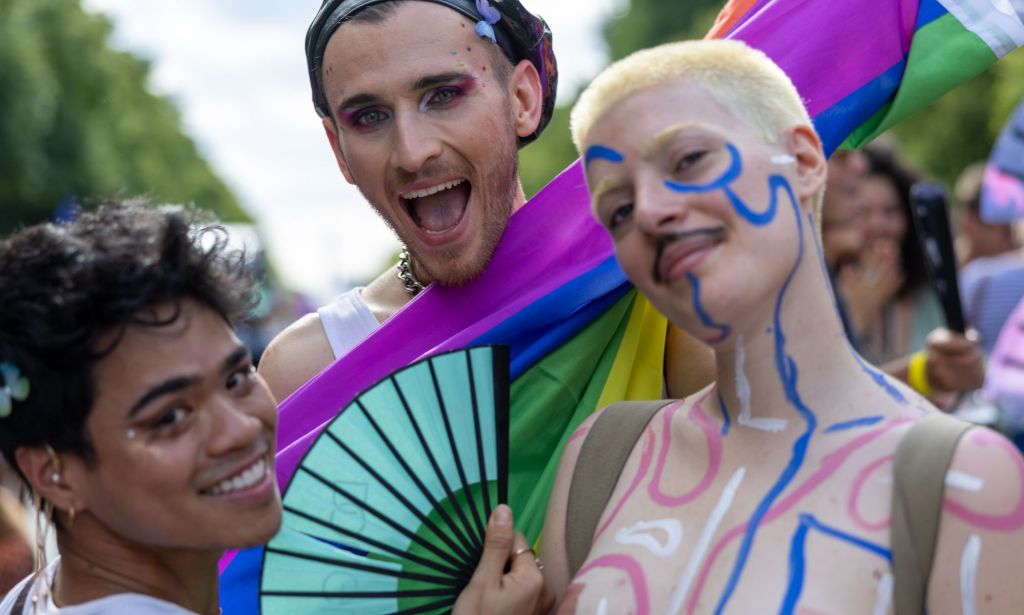Rebecca Denison expected to have a short life. She’d acquired HIV as a college student in the 1980s, she told the audience at an infectious disease conference in San Francisco earlier this month, and got an official diagnosis in 1990. “Back then,” she said matter-of-factly, “It was understood we were all going to die.” Within six years, that all changed. A new generation of drugs called protease inhibitors, when combined with other drugs, made the virus virtually undetectable in people with HIV, giving them a much greater chance of living to old age.
“Your work saved my life,” Denison, now an advocate for HIV-positive women, told the room.
She’s not alone. Over the last three decades, the development of preventative medicines along with better testing and treatment have cut new annual HIV infections by a staggering 60 percent globally. Now, a strategy of taking drugs before an HIV encounter—pre-exposure prophylaxis, or PrEP—can reduce the risk of transmission during sex by up to 99%.
Then, last year, scientists unveiled another, critical development: In a clinical trial of more than 5,000 girls and young women in Africa, a twice-annual shot called lenacapavir, administered as PrEP, blocked HIV infection for 100 percent of the more than 2,000 participants who’d received it. Shortly after, in a 3,000-person, multi-gender study across seven countries, 99.9% of participants who got lenacapavir did not acquire HIV. A drug that worked this well (and required an injection just once every six months, no less) had never been seen before.
“It’s like, ‘Oh my god,’ we might have this tool that can really put an end to HIV.”Anna Katomski, a former program analyst at the United States Agency for International Development (USAID)
“I was sobbing,” Anna Katomski, a former program analyst at the United States Agency for International Development (USAID), recalls when she first saw the results presented at a conference. Lenacapavir isn’t a vaccine; such a thing has eluded scientists for decades. But as Science put it in an article naming the drug its 2024 “Breakthrough of the Year,” it may be the “next best thing”—a long-lasting, injectable, highly efficacious preventative. “There was just such a feeling of optimism,” Katomski says, adding, “It’s like, ‘Oh my god,’ we might have this tool that can really put an end to HIV.”
But now, that’s all at risk. As Denison warned in her speech at the conference in San Francisco, Robert F. Kennedy Jr., who once said that HIV was caused by the “gay lifestyle” and “poppers,” now heads the Department of Health and Human Services; thousands of government workers, including Katomski, have seen their jobs terminated or funding cut; and the so-called “Department of Government Efficiency,” led by tech billionaire Elon Musk, shuttered USAID, a decision that officials say will hamper the country’s ability to fight malaria, polio, tuberculosis, HIV/AIDS, and other diseases across the world. The clawbacks don’t end there: Last week, the Wall Street Journal reported that the Trump administration is considering cutting funds at the Centers for Disease Control and Prevention (CDC) for domestic HIV prevention, too.
Particularly worrisome for HIV researchers is the threat to PEPFAR — the US President’s Emergency Plan for AIDS Relief — a program created in 2003 by Republican President George W. Bush to bring HIV treatments to the world, largely delivered through USAID. On January 20, President Donald Trump issued an executive order to “reevaluate and realign” the country’s foreign aid policies and called for a 90-day review of related programs. Shortly after, the Trump administration ordered the shutdown of operations at USAID, including work on PEPFAR. The administration has since backtracked, issuing a waiver allowing some PEPFAR programs to continue, including PrEP for pregnant and lactating women, but not for other “key populations” like LGBTQI people and sex workers, says Nidhi Bouri, the former deputy assistant administrator for Global Health at USAID. With foreign aid now under review through April 19, PEPFAR’s future is unclear.
This is a program that, throughout its 20-plus-year history, has saved an estimated 26 million lives. “It is the greatest act of humanity in the history of fighting infectious diseases that the world has ever known,” former PEPFAR head John Nkengasong recently told Science magazine.
Without a renewal of US aid, the world could see more than six times more new HIV infections by 2029.
So, what would it mean to walk away from this great act of humanity? In short, says Monica Gandhi, who directs the University of California, San Francisco-Bay Area Center for AIDS Research, it would be a “disaster.” Without a renewal of US aid, UNAIDS Executive Director Winnie Byanyima told the Associated Press last month, the world could see more than six times more new HIV infections by 2029, and a ten-fold increase in deaths to more than six million. Quite literally, it’s death by a thousand cuts.
Gandhi also worries about the possibility of HIV gaining resistance to drugs. As she explains, effectively treating HIV requires daily, combination antiretroviral drugs. Without reliable access to clinics and aid, she warns, people may try to stretch their pill supply, taking medicine less often or sharing with family members. “If you do this kind of rationing, what it leads to is drug resistance.”
And PEPFAR isn’t the only HIV program at risk. Several high-profile studies have also shut down in response to Trump’s order. One set of trials known as the MATRIX Study, a $125 million endeavor funded by USAID, was designed to evaluate new HIV prevention products for women, including a dissolvable vaginal film, dissolvable vaginal insert, and a vaginal ring meant to prevent pregnancy and HIV transmission. Catherine Chappell, an assistant professor and OB/GYN at the University of Pittsburgh who helped lead the trial for the vaginal ring, says Trump’s order meant her Phase I clinical trial was abruptly ended mid-data-collection. “We had participants in South Africa that still had these [placebo] rings in their vaginas,” she says. Chappell worries that dropping the study midway through could have “irreparably damaged” researchers’ relationship with the community. “It is just completely unethical,” she says.
Similarly, Katomski, the former USAID analyst, had been in the midst of data analysis on the MOSAIC study, a three-part trial intended to evaluate various forms of PrEP (oral, injectable, and vaginal ring) in women and girls. When the study stopped, so did Katomski and her colleagues’ analysis and data dissemination to partners and participants. “It not only is such a violation of ethics codes that we follow as researchers,” she says, “but also, from a scientific standpoint, it’s just such a waste of US taxpayers’ dollars.” Before losing her job at USAID, Katomski’s research division was considering trials for lenacapavir, the 2024 “breakthrough” drug. “All of that’s just been cut off,” she says.
It’s unclear how, exactly, this recent shift in priorities happened. Over the last 20 years, PEPFAR has seen wide, bipartisan support. In a 2023 op-ed published in The Hill, a group of senators, including Lindsey Graham (R-S.C.), one of Trump’s most vocal supporters, urged the reauthorization of PEPFAR, writing, “We must come together once again to reauthorize PEPFAR and work to end AIDS as a public health threat by 2030. Now is the time to remind the world what American leadership can accomplish when we put our minds and hearts to it.” Even former Sen. Marco Rubio, now Trump’s Secretary of State—who oversaw the purging of USAID—praised the agency’s work on “more than two dozen occasions” over the years, according to fact-checking site PolitiFact, “from hurricane relief to battling infectious diseases to aiding refugees.”
In short, after decades of research, science delivered the most effective, preventative HIV drugs the world has ever seen—and the US is throwing up its hands and abandoning efforts to share them with those most in need. That isn’t just a moral failing, experts say, it also goes against the country’s self-interest. For decades, officials have seen foreign disease prevention as a form of “soft power”—it engenders trust within the global community, while ensuring fewer infections both abroad and ultimately, at home. “When you prevent disease transmission, whether that be HIV, whether that be tuberculosis, whether that be malaria, in one area of the world,” Katomski says, “it prevents that disease from coming back to the United States.”
All of this is to say, now is a uniquely bad time to walk away from HIV research and aid. As Anthony Fauci, the former head of the National Institute of Allergy and Infectious Diseases, told conference attendees via video in San Francisco, “We can end the global HIV epidemic. We have the resources to do so.”
“Now is not the time to pull back,” he said, “for history will judge us harshly if we squander the opportunity that is before us.”

